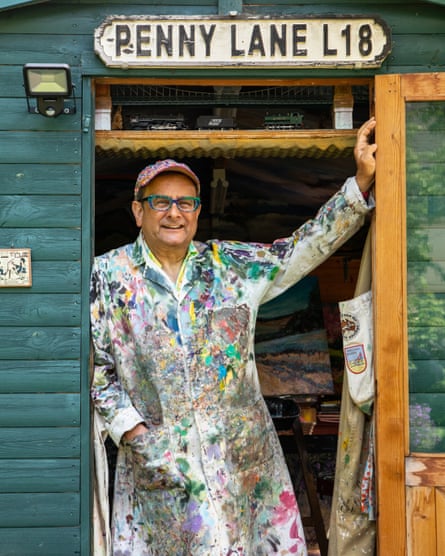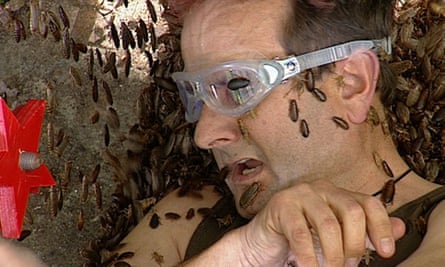Children’s television presenters occupy a strange place in one’s memory, somewhere between grandparents and primary school friendships. They are not mere celebrities, but a part of your childhood, and if you grew up in the 80s and spent most of your time watching TV, as I did, then Timmy Mallett will occupy such a space. In the mid 80s, he was one of the team of presenters of Wide Awake Club, the Saturday-morning children’s show, although it is only Mallett, with his garish clothes and colourful glasses, that I can really remember. He quickly also became the face of the school-holiday show Wacaday. A whole generation of children grew up hitting their siblings over the head with a cushion, or worse, as they recreated his word association game Mallett’s Mallet at home.
Mallett, now 64, has written a memoir, following the journey of a two-month bike ride through France and Spain two years ago, taking the Camino de Santiago pilgrimage route. The book is punctuated with memories of his life and career, which is why we are talking, on a sunny day in lockdown, over Zoom. Mallett is mostly an artist these days, so life has changed very little.
“I suppose going off on a longer adventure would be something I would like to do, and also seeing friends,” he says. But he paints every day, doing a live session on Facebook, where he always appears wearing a different pair of coloured glasses. He recites poetry and stories, and seems utterly delighted with life, even in the middle of lockdown.
It’s still spring when we speak, and he has been painting the season. “It’s a magnificent spring,” he says. “Is that a coincidence?” I don’t know, I say – is it objectively more magnificent, or is it that we have slowed down to notice it? “We’re certainly noticing it. This is a spring we’ll all remember and there’s never been a brighter, more colourful, more spectacular spring. I was out on my bike doing my bit of daily exercise and I was surprised to see, about a week ago, the horse chestnuts in flower, like candelabra. I’m just noticing colour. Colour, colour, colour.”

The inspiration for the Santiago bike adventure was Mallett’s brother Martin, who was two years older than him and died shortly before Mallett set off. Well, the inspiration was Martin, and Mallett’s great heroine, Eleanor of Aquitaine, the 12th-century queen over whose lands he travelled. (Mallett’s book is a fun read – at once a history lesson, travelogue, love letter to cycling, autobiography and motivational manual, with some perhaps unintended but endearingly hilarious lines such as “tarmac is the same all over the world”.)
Martin had Down’s syndrome, and his whole life, says Mallett, was about “reaching his potential”. He lived in a supported community in Aberdeen, where he worked in the bakery. Although Martin had early-onset dementia and died at the age of 64, “it’s not the length of your life, it’s the depth and breadth and all the rest of filling it all. And boy, did Martin fill it,” says Mallett.
Mallett was the youngest of three boys. “I always knew Martin was different,” he says. “But it was quite useful having a bigger brother who would play the games I wanted to play. For Martin, it was always just about being together, that was the important thing. When he would come to visit us in later years, our Billy’s an only child and he would say: ‘Come on, Uncle Martin, let’s do this.’ ‘Yeah.’ I instantly saw it again, the same pattern. How nice is that, to just have somebody to play with?”
The boys grew up in a small town in Greater Manchester, their father working as an artist for a textile company before joining the clergy. Mallett remembers his mother giving talks about being the parent of a “mentally handicapped” child. “That phrase just sounds awful, doesn’t it? She would say: ‘Martin was born a mongol.’ Wow. That’s how people talked about it.”
Martin was born in 1953, at a time when it was common for babies with Down’s syndrome to be institutionalised. “Mum and Dad didn’t hide him away,” says Mallett. “They allowed him to make the most he could of his abilities.” There is only one instance that sticks in his mind of Martin being bullied, as the two of them were on their way to Cubs. “A group of kids picked on us. One of the group said: ‘He goes to our school,’ pointing at me, ‘get the other one.’ There was a bit of pushing and shoving and roughing up Martin, and we ran off in tears. And the big Cubs, when they saw us arriving, dishevelled and upset, went out to go and sort out our attackers. Whether they ever did or not is irrelevant; the fact is, Martin was part of the group and they weren’t going to have that.”

What Mallett mainly remembers about his brother is how adventurous he was. “He would get lost; he always had wanderlust, he was always off exploring. Now that I’m a parent, you know that must have been really worrying. I remember my dad going down to the canal and dreading that moment where he’d have to look over into the lock.” Martin, like other people with Down’s syndrome growing up at that period, was not expected to live for long. Did it feel like that was hanging over the family? Mallett pauses. “I’m not sure it hung over me. I was aware that people said that, and that people with Down’s syndrome don’t necessarily live as long as others, but that’s not really true these days.”
Once Mallett and his eldest brother, Paul, left home, their parents would hear Martin talking to himself at night and realised it was time for him to move on with his life, too. He moved to a Camphill community, for people with learning disabilities, in Aberdeen. Mallett is proud of how much financial support Martin received from the local authorities throughout his life. “Are we as good about doing that these days?” he says of the cuts that have hit hardest among people with disabilities.
Growing up, Mallett wanted, like many children, to be a pop star. “I didn’t think that would actually happen and I would have a No 1 hit around the world,” he says – his single Itsy Bitsy Teeny Weeny Yellow Polka Dot Bikini, released by his band Bombalurina, was unavoidable in the summer of 1990. “I mean, that makes me go: ‘Wow, that was a dream I had.’” Was he always a show-off? He laughs. “Yeah. In my book, I talk about our pop group, The Kettle Holders. Paul couldn’t remember the words, Martin couldn’t say the words, so I just made them up and sang them.”
By the time he got to Warwick University, to study history, “I knew I wanted to go into broadcasting. I knew I wanted to be a DJ, an entertainer.” He had a university radio show, then got a slot on Radio Oxford, and then at Manchester’s Piccadilly Radio, where a series of helpers included the young Chris Evans, Nick Robinson and Brian Cox. When the TV station TV-am launched in 1983, Mallett was brought in to host the children’s shows.
“I loved it. I liked the fact that it was make it up as you go along, and try things out. You’d have a week going: ‘Here we are in Blah-lin, in Blah-many.’ You just repeat those gags and it becomes part of the language. Here’s a nice little thing, I’ve got something to show you …” He goes off, and returns a few seconds later with Pinky Punky, the soft toy mallet from the show (Mallett sells them, along with a full range of other themed merchandise, on his website). “He made his first appearance on Wacaday 30 years ago. What soft toy lasts 30 years?”
My sister and I used to play endless games of Mallett’s Mallet, I say. “Good!” He says it’s “lovely” that there is a whole generation who have fond memories of him. “It also reminds me that, you know, there’s a responsibility here.” The other show I loved, I say, was Jim’ll Fix It, presented by Jimmy Savile, whose horrendous serial sex abuse came to light only after he died. Did Mallett ever have any dealings with him? He suddenly goes quiet and serious, a dark cloud passing. “No. No. Never met him.” Were there stories going around in children’s TV circles about him at the time? “No,” says Mallett. “If there were, I never heard them.”

Wacaday came to an end in 1992, when TV-am closed. Did he worry about what he would do next? No, he says. He went into TV production, did some panto, some stage shows. For a while he played the student circuit. “I remember thinking: ‘Why would I be being booked for students?’ Well, because little Wideawakers had suddenly grown up and gone to uni.” He wondered if he needed to make Mallett’s Mallet edgier, to entertain a drunken student crowd. “But no, you keep it as wholesome and as lovely as it was when you were eight years old.” He still tours holiday camps, though not this summer. “I guess they’ll come back next year,” he says.
Mallett has a wardrobe full of his “original colourful Timmy gear. That’s weird isn’t it?” Does he still wear it? “I do occasionally, yeah. If I’m going on stage and stuff, yes, I would do – it’s funny, isn’t it, to see all those bright and colourful things, but colour has always been a part of who I am. What am I wearing here?” He looks down at his green shirt with darker splodges on it, and takes his glasses (also green) off to see which pair he is wearing today. Does he feel under pressure to perform, in everyday life, as the wacky “Timmy Mallett”? “No. I’m quite comfortable in who I am and what I do and, honestly, it’s not a pressure. I am Timmy Mallett and this is who I am.”
There hasn’t been much TV work in recent years – in 2008, he was a contestant on I’m a Celebrity and featured in a Skepta music video – but he says: “I don’t sort of hanker for it. I’ve got a busy life.” What plans does he have? “I’ve got quite a few, but here’s the thing – I haven’t discussed them yet with Mrs Mallett, and I’m very much aware that when I started planning for the Camino, she did mention ‘it would have been nice if you’d asked’.” And, yes, he does call Lynda, his wife of 30 years, Mrs Mallett in real life, he says. “There’s something about ‘Mrs Mallett’. It’s quite respectful and it adds a certain stature to the relationship, if you like. What do you call your partner?” By his name, like a normal person. Mallett smiles.

The Camino had been planned for a long time before Martin died, he says, although he set off two days after his brother’s funeral. “It wasn’t planned as a grief ride; it was planned as a celebration of reaching your potential, with Martin as the inspiration. He knew I was going on the bike ride because I had discussed it with him. I said: ‘I’m going on a bike ride, Martin, a big bike ride.’ ‘You and me,’ he said. Wow. And that’s when I knew that I was going to carry him in my heart.”
The ride taught him about planning for the unexpected, and a willingness to be vulnerable. “Being vulnerable opens you up to the possibility of acts of random kindness. ‘Be kind to yourself’ – I’ve been hearing that phrase in this lockdown.” The other thing he tried to remember, he says, is “these are the golden years. And, you know, life is a whizz through at a million billion gazillion miles an hour. The important thing to do is to fill every moment, like my dear brother. Reach your potential. It’s not about being the best in the world, just be the best that you can be.”
It looks like a platitude when it is written down but, delivered in a voice from childhood, eyes sparkling beneath wacky glasses, pink foam mallet just visible, it sounds wise.
